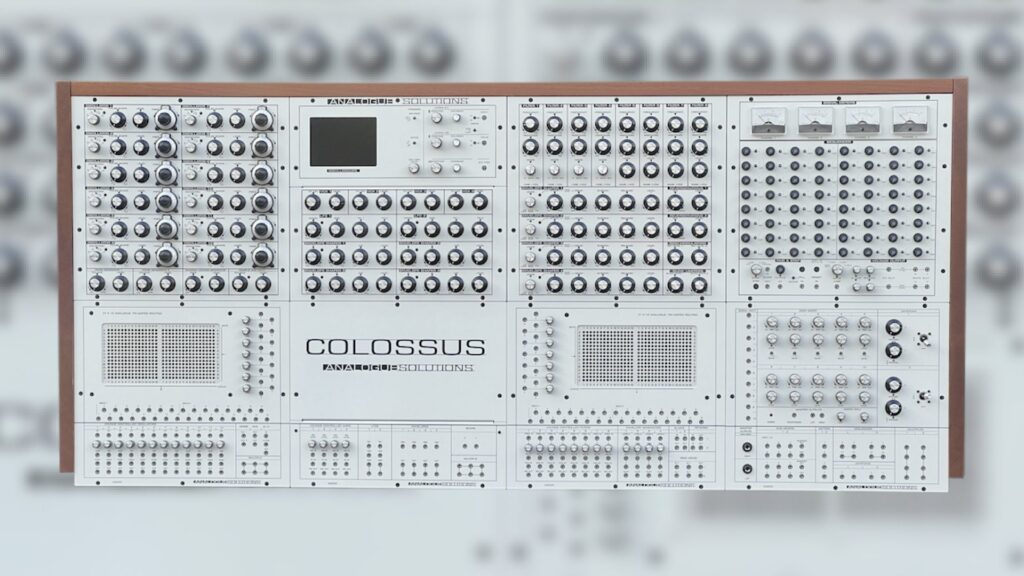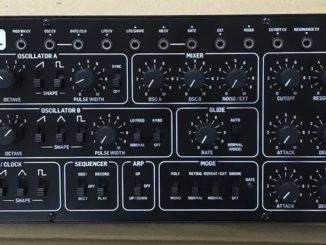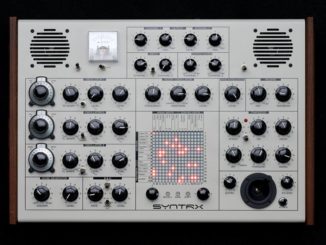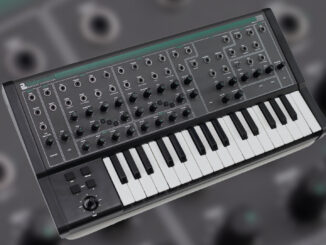Analogue Solutions Colossus Slim AS200 is a new semi-modular analog Synthesizer expanding the Colossus family with a company version.
The Analogue Solutions Colossus is a true epic Synthesizer. With 12 analog VCOs, eight filters (lowpass/multimode)…, and an EMS-like design, the Colossus is one of the enormous synthesizers ever released. In terms of price, it also plays in the league of the big ones like the Moog Modular.
If this analog beast is too big for your studio, Analog Solutions now has an alternative. Also a monster but more compact and a bit cheaper. Okay, only a little.
Analogue Solutions Colossus Slim AS200
The Colossus Slim AS200 is 50% slimmer than the original. That’s because the “table” part with four pin matrices, joysticks, and the touch keyboard is omitted. Analogue Solutions says: “a ‘space-saving version of the original Colossus classic. Ideal for those with a little less spare studio space, or perhaps with very restricted access for installation”.
The engine, however, remains the same: full analog with 12 oscillators, eight filters, 4 ASR envelopes, two ring modulators, 12 VCAs, six mixers, and more. Even if the table part has been omitted, the Colossus Slim AS200 has two independent pin matrices for patching. Thus, the signal path can be designed freely.
Then it also hosts a two-channel LCD oscilloscope instead of a CRT device. An upgrade is, however, available. And like on the big brother, no MIDI. The rest stays the same. So you get also the 4 large signal level meters with backlit, a 64-step sequencer, and more.
An analog dream. That’s exactly what the slim monster remains for most people. However, nice to see that the Colossus family is growing and that you can get now a more compact version of it.
Analog Solutions Colossus Slim AS200 is available now for £23500.
More information here: Analogue Solutions





Why, oh why, have I never been £20k+ blown away by the demos?
Why?
Is it because the barrier to entry excludes the reckless and the outliers?
This and the Schmidt spring to mind.
A Schmidt is on Ebay at the moment for more than the new price. The seller is a collector pumping up its ‘rare’ credentials. A quick email to Schmidt confirms that one is in stock and more will be available late spring.
Even though I’m a potential customer I feel hard-pressed to discern the value of this instrument in pure musical terms. £23k spent on eurorack would very likely provide superior sonic capabilities by every metric. Rarity and visually aesthetic qualities of the Colossus would very much outclass a eurorack solution.
Bring on the collectors. Bring on the secondhand descriptions remarking on how pristine and little use their instruments have had.
First: Beautiful instrument!
Second: Of course, the Colossus and Schmidt aren’t for everyone. Their price tags may be steep, but for serious musicians and sound designers, the investment is well worth it. And for those who are truly passionate about their craft, the jealousy and bitterness of others won’t be enough to hold them back from exploring the many creative possibilities that these synths have to offer. So, instead of succumbing to jealousy or negativity, embrace the power of these incredible instruments and see where they can take you. Good luck.
My point: they aren’t for serious musicians. To clarify, whilst a handful of serious musicians may well buy this class of instrument, they are often bought by synth fans with deep pockets, collectors, investors and scalpers (eg. used Cirklon v2 sell for £4k+, Osmose £2k+). This disrupts the market for serious musicians.
‘the investment is well worth it’ You’ll have to show me the numbers on that, I mean, are we talking money or art? As far as art, I’m still waiting for a Colossus demo that isn’t safe, tame and ‘steeped in nostalgia’, cough 😉
[BTW, Jealousy is for when you already have something and you fear someone will take it away. Envy, for when you want something that someone else has.]
I understand that the price tags on instruments like the Colossus and Schmidt may seem steep, but let’s not forget that these instruments are the result of countless hours of research, development, and craftsmanship. And while they may not be for everyone, they are certainly worth it for those who are passionate about music and sound design. But if I’m reading your response correctly, you’re actually saying that these synths are disrupting the market for serious musicians? I’m not sure I follow. If anything, I would argue that the availability of high-end instruments like the Colossus and Schmidt actually benefits serious musicians, as it gives them access to powerful tools that can help them push the boundaries of their craft. As for your comments about collectors and investors, I don’t see how their interest in these instruments is any different from that of a serious musician. At the end of the day, it’s about finding the tools that inspire you to create something truly unique and meaningful. And who knows, maybe one day you’ll be the envy of others for the incredible music you’re able to create with the Colossus or Schmidt — or anything else.
“As for your comments about collectors and investors, I don’t see how their interest in these instruments is any different from that of a serious musician”
You don’t see the difference in someone selling a CS80 for £50k or a Cwejman s1mk2 for £9k compared to the £10k and £3.5k they bought them for? Or an Osmose they paid £1.5k for selling for £2.5k? Or the Cirklon 2 they paid £2k for, for £4.5k.
Obviously, such moves do the opposite of helping musicians find inspiring tools.
And for collectors too? How does someone buying and then not using a Colossus help musicians? It’ll help Analogue Solutions for sure. But any buisness model that relies on a significant proportion of customers buying to not use their products? Ill-fated springs to mind.
As for R&D and the Colossus, seriously? You’ll have to explain where the innovations are. Big? Not quite as big? White? Wood? Pin matrix? 12 osc? Scope? Nope.
£23.5k non-Moog? Imposing aesthetic? Bingo.
It seems R&D was bottom-up, not top-down, that it was driven by their mainstream products.
“as it gives them access to powerful tools that can help them push the boundaries of their craft”
Exactly. Which is why I question the nature of the demos that Analogue Solutions have put out. Their marketing is clearly geared towards selling its non-musical qualities.